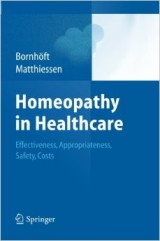The Swiss HTA report on homeopathy
A Health Technology Assessment report1 was commissioned by the Swiss health authorities to inform decision-making on the further inclusion of homoeopathy in the list of services covered by statutory health insurance.
According to the authors, their report “confirms homoeopathy as a valuable addition to the conventional medical landscape – a status it has been holding for a long time in practical health care.“
To quote the report’s official conclusion:
“There is sufficient evidence for the preclinical effectiveness and the clinical efficacy of homeopathy and for its safety and economy compared with conventional treatment.”
For a short overview of the Swiss report, see HRI Spring 2012 research article.
Swiss report findings
- The evidence from laboratory studies and clinical research shows that homeopathy is effective, and homeopathy as practised in Switzerland is cost-effective and safe.
- 20 of 22 systematic reviews of clinical trials showed a positive direction of evidence in favour of homeopathy.
- Strongest evidence of effectiveness was found for Upper Respiratory Tract Infections and Allergic Reactions (URTI/A).
29 studies identified, 24 of them showing positive results. - Report discredits the Lancet 2005 meta-analysis by Shang et al.2 (the only comprehensive systematic review ever to conclude that homeopathy works no better than placebo). To quote the Swiss report authors,“…. we can say with certainty that the Shang et al 2005 study does not prove that homeopathy has no effect”.
Swiss report key facts
- HTA is a well-recognised research method used to assess real-world effectiveness, safety and cost-effectiveness of treatments e.g. for the UK’s National Health Service.
- Report was commissioned by Swiss Federal Office for Public Health (BAG).
- Report summarised the findings of a seven-year review of the evidence on homeopathy, conducted as part of a wider ‘Program of Evaluation of Complementary Medicine (PEK)’.
- 2006 – Short summary of the report,3 concluding that homeopathy is clinically effective and safe, is published in a scientific journal in German.
- 2009 – Public referendum in Switzerland supports inclusion of homeopathy and other complementary and alternative medicines in the list of treatments covered by Swiss public health insurance, with 67% voting in favour.
- 2011 – English translation of the full HTA report1 published in booklet form bringing wider awareness to the report’s endorsement of homeopathy.
- 2011 – Swiss government decides that homeopathy will be covered by public health insurance from 2012 until the end of 2017 as part of a temporary scientific evaluation plan to determine whether state coverage should be made permanent.
- 2017 – Swiss government decides that basic public health insurance will continue to cover complementary medical services, including homeopathy, indefinitely.
Controversy over the Swiss report
The strongly positive conclusions of the Swiss HTA report sparked controversy in academic circles, including publication of an accusation of research misconduct4 – a serious charge against which the authors defended themselves directly in an article of response.5
What is a Health Technology Assessment (HTA)?
HTAs, which provide information that is directly relevant to decision-makers, are the cornerstone of the UK’s NIHR (National Institute of Health Research) strategy for assessing real-world effectiveness, safety and cost-effectiveness of therapeutic interventions for the NHS.
Many types of research such as randomised controlled trials, systematic reviews and meta-analyses ask, ‘Does this treatment work under artificial test conditions?’ By contrast, HTAs ask much broader questions such as ‘Does this treatment work in real life clinical situations?’ ‘How it is used?’ ‘Is it safe?’ and, ‘Is it cost-effective?’ More
1. Homeopathy in Healthcare: Effectiveness, Appropriateness, Safety, Costs by Gudrun Bornhöft and Peter F. Matthiessen (Editors). 2011. ISBN 978-3-642-20637-5. | FullText
2. Shang A, Huwiler-Muntener K, Nartey L, et al. Are the clinical effects of homeopathy placebo effects? Comparative study of placebo-controlled trials of homeopathy and allopathy. Lancet, 2005; 366: 726–732 | Abstract
3. Bornhöft G, Wolf U, von Ammon K, Righetti M, Maxion-Bergemann S, Baumgartner S, Thurneysen AE, Matthiessen PF. Effectiveness, safety and cost-effectiveness of homeopathy in general practice – summarized health technology assessment. Forsch Komplementmed., 2006;13(Suppl 2):19-29 | Abstract
4. Shaw DM. The Swiss report on homeopathy: a case study of research misconduct. Swiss Med Wkly, 2012; 31:142 | Abstract | FullText
5. von Ammon K, Bornhöft G, Maxion-Bergemann S, Righetti M, Baumgartner S, Thurneysen A, Wolf U, Matthiessen PF. Familiarity, objectivity and misconduct. Counterstatement to Shaw DM. The Swiss Report on homoeopathy: a case study of research misconduct. Swiss Med Wkly 2012; 31: 142. Swiss Med Wkly, 2013; 17:143 | Abstract | FullText





